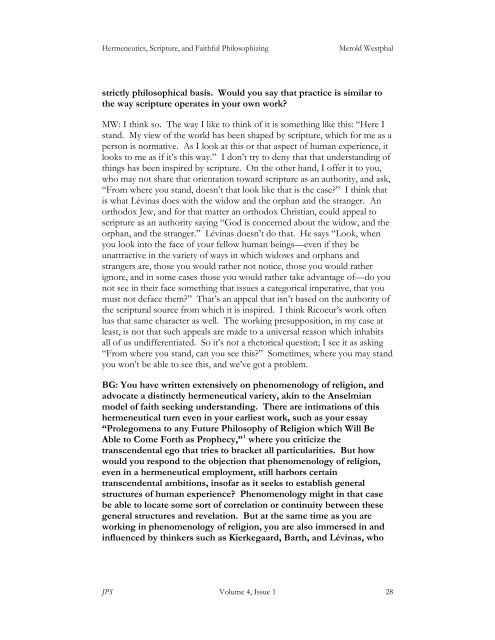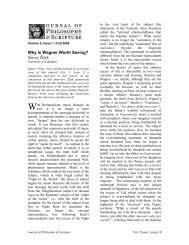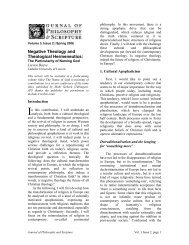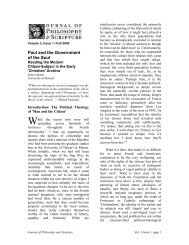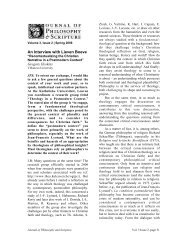interview with Merold Westphal - Journal of Philosophy and Scripture
interview with Merold Westphal - Journal of Philosophy and Scripture
interview with Merold Westphal - Journal of Philosophy and Scripture
You also want an ePaper? Increase the reach of your titles
YUMPU automatically turns print PDFs into web optimized ePapers that Google loves.
Hermeneutics, <strong>Scripture</strong>, <strong>and</strong> Faithful Philosophizing <strong>Merold</strong> <strong>Westphal</strong><br />
strictly philosophical basis. Would you say that practice is similar to<br />
the way scripture operates in your own work?<br />
MW: I think so. The way I like to think <strong>of</strong> it is something like this: “Here I<br />
st<strong>and</strong>. My view <strong>of</strong> the world has been shaped by scripture, which for me as a<br />
person is normative. As I look at this or that aspect <strong>of</strong> human experience, it<br />
looks to me as if it’s this way.” I don’t try to deny that that underst<strong>and</strong>ing <strong>of</strong><br />
things has been inspired by scripture. On the other h<strong>and</strong>, I <strong>of</strong>fer it to you,<br />
who may not share that orientation toward scripture as an authority, <strong>and</strong> ask,<br />
“From where you st<strong>and</strong>, doesn’t that look like that is the case?” I think that<br />
is what Lévinas does <strong>with</strong> the widow <strong>and</strong> the orphan <strong>and</strong> the stranger. An<br />
orthodox Jew, <strong>and</strong> for that matter an orthodox Christian, could appeal to<br />
scripture as an authority saying “God is concerned about the widow, <strong>and</strong> the<br />
orphan, <strong>and</strong> the stranger.” Lévinas doesn’t do that. He says “Look, when<br />
you look into the face <strong>of</strong> your fellow human beings—even if they be<br />
unattractive in the variety <strong>of</strong> ways in which widows <strong>and</strong> orphans <strong>and</strong><br />
strangers are, those you would rather not notice, those you would rather<br />
ignore, <strong>and</strong> in some cases those you would rather take advantage <strong>of</strong>—do you<br />
not see in their face something that issues a categorical imperative, that you<br />
must not deface them?” That’s an appeal that isn’t based on the authority <strong>of</strong><br />
the scriptural source from which it is inspired. I think Ricoeur’s work <strong>of</strong>ten<br />
has that same character as well. The working presupposition, in my case at<br />
least, is not that such appeals are made to a universal reason which inhabits<br />
all <strong>of</strong> us undifferentiated. So it’s not a rhetorical question; I see it as asking<br />
“From where you st<strong>and</strong>, can you see this?” Sometimes, where you may st<strong>and</strong><br />
you won’t be able to see this, <strong>and</strong> we’ve got a problem.<br />
BG: You have written extensively on phenomenology <strong>of</strong> religion, <strong>and</strong><br />
advocate a distinctly hermeneutical variety, akin to the Anselmian<br />
model <strong>of</strong> faith seeking underst<strong>and</strong>ing. There are intimations <strong>of</strong> this<br />
hermeneutical turn even in your earliest work, such as your essay<br />
“Prolegomena to any Future <strong>Philosophy</strong> <strong>of</strong> Religion which Will Be<br />
Able to Come Forth as Prophecy,” 1 where you criticize the<br />
transcendental ego that tries to bracket all particularities. But how<br />
would you respond to the objection that phenomenology <strong>of</strong> religion,<br />
even in a hermeneutical employment, still harbors certain<br />
transcendental ambitions, ins<strong>of</strong>ar as it seeks to establish general<br />
structures <strong>of</strong> human experience? Phenomenology might in that case<br />
be able to locate some sort <strong>of</strong> correlation or continuity between these<br />
general structures <strong>and</strong> revelation. But at the same time as you are<br />
working in phenomenology <strong>of</strong> religion, you are also immersed in <strong>and</strong><br />
influenced by thinkers such as Kierkegaard, Barth, <strong>and</strong> Lévinas, who<br />
JPS Volume 4, Issue 1 28


